BJC: Drinking tea is related to a decrease in risks of gastric cancer
- Normal Liver Cells Found to Promote Cancer Metastasis to the Liver
- Nearly 80% Complete Remission: Breakthrough in ADC Anti-Tumor Treatment
- Vaccination Against Common Diseases May Prevent Dementia!
- New Alzheimer’s Disease (AD) Diagnosis and Staging Criteria
- Breakthrough in Alzheimer’s Disease: New Nasal Spray Halts Cognitive Decline by Targeting Toxic Protein
- Can the Tap Water at the Paris Olympics be Drunk Directly?
BJC: Drinking tea is related to a decrease in risks of gastric cancer
- Should China be held legally responsible for the US’s $18 trillion COVID losses?
- CT Radiation Exposure Linked to Blood Cancer in Children and Adolescents
- FDA has mandated a top-level black box warning for all marketed CAR-T therapies
- Can people with high blood pressure eat peanuts?
- What is the difference between dopamine and dobutamine?
- How long can the patient live after heart stent surgery?
BJC: Drinking tea is related to a decrease in risks of gastric cancer
Drink at least three cups of tea a day! Scientists analyzed the data of nearly 30,000 people and found that drinking more tea and green tea is related to a decrease in the risk of gastric cancer.
In today’s fast-paced society, drinking a cup of tea can not only relieve fatigue, but also relieve anxiety and bring a little spiritual enjoyment in the midst of busyness.
According to statistics, tea is the beverage with the largest sales volume in the world after water. According to statistics, the global sales volume in 2020 is about 6.3 billion kilograms, and it is expected to increase by 17.4% by 2025[1].
In vivo and in vitro studies have shown that tea polyphenols have certain benefits for inflammation and prevention of chronic diseases, including some cancers, diabetes, and cardiovascular disease [2].
However, at present, whether tea drinking is related to the risk of gastric cancer, the existing epidemiological studies have shown inconsistent results, and there is still controversy [3-5].
Recently, a research team led by Professor Georgia Martimianaki of the University of Milan published a new analysis in the British Journal of Cancer [6]: The data of the Global Gastric Cancer Joint (StoP) project showed that compared with infrequent tea drinkers, the The adjusted odds ratio (OR) for gastric cancer among tea drinkers was 0.91, and if they drank 1-2 cups of tea per day, the OR was 1.01; and if they drank ≥3 cups of tea per day, the OR dropped to 0.91.
In addition, in China and Japan (OR: 0.67), Helicobacter pylori (Hp) infected subjects (OR: 0.68), and subjects with gastric cardia cancer (OR: 0.64) who regularly drank green tea, tea consumption was associated with the risk of gastric cancer.
There is a strong negative correlation. These data suggest that drinking tea may be a coup for preventing gastric cancer!
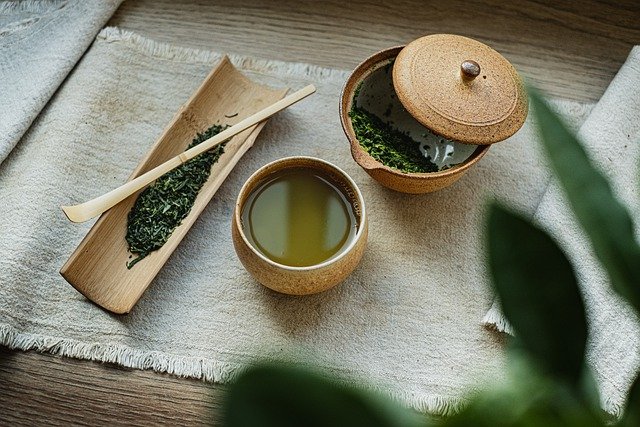
This study included 22 relevant studies from the StoP project covering a wide range of geographies, including Greece, Italy, Canada, Russia, Portugal, the United States, Spain, Japan, Mexico, Brazil, Iran, and China. There were 9438 gastric cancer patients and 20451 controls.
Compared with the control group, the case group was more male (66.1% vs 59.6%), more than 65 years old (52.8% vs 45.4%), and had a lower socioeconomic status (50.6% vs 37.3%);
In addition, the proportion of frequent smokers in the case group (8.2% vs 6.7%), the proportion of binge drinking ≥ 4 drinks per day (15.0% vs 11.2%), and the proportion of those with a family history of gastric cancer were all higher (18.4% vs 8.3%). %).
In a one-stage analysis, the researchers found that the adjusted OR for frequent tea drinkers was 0.91 (95% CI: 0.85-0.97) compared with infrequent tea drinkers; the OR for the two-stage analysis was similar to the one-stage analysis (OR: 0.92, 95% CI: 0.82-1.05).
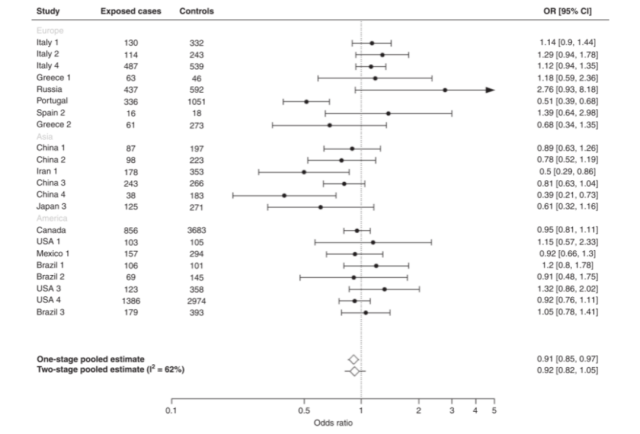
Association analysis of frequent tea drinkers and gastric cancer throughout the study
Of the 22 relevant studies, 18 studies collected information on the intensity of tea drinking, of which 26.2% of the case group and 30.6% of the control group reported drinking ≥1 cup of tea per day.
One-stage analysis showed that compared with infrequent tea drinkers, those who drank ≥1 to <2 cups of tea per day had an adjusted OR of 1.03 (95% CI: 0.94-1.12);
those who drank ≥2 to <3 cups of tea per day Adjusted OR 0.98 (95% CI: 0.88-1.10); ≥3 cups of tea per day, adjusted OR 0.91 (95% CI: 0.80-1.03), although not reaching statistical significance (p=0.27), But with the increase of tea drinking, the OR value showed a downward trend .
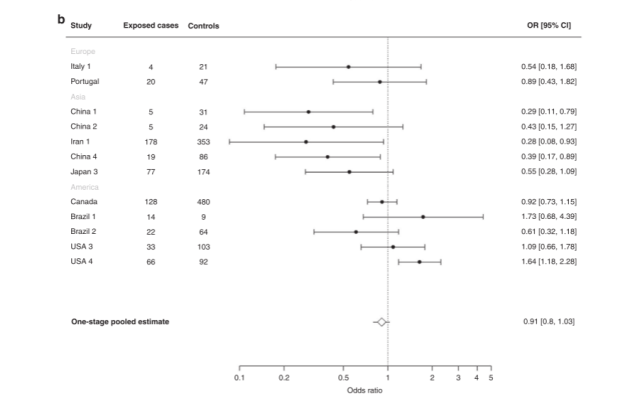
Association between drinking ≥3 cups of tea per day and gastric cancer
When a category-specific analysis of tea drinking habits was performed, the results showed that drinking cold or warm tea was significantly inversely associated with gastric cancer risk compared with those who did not drink tea (OR: 0.65, 95% CI: 0.53-0.79);
For those who drank hot or very hot tea (OR: 1.04, 95% CI: 0.88-1.23) and strong or very strong tea (OR: 1.11, 95% CI: 0.89-1.39), there was no association with gastric cancer risk .
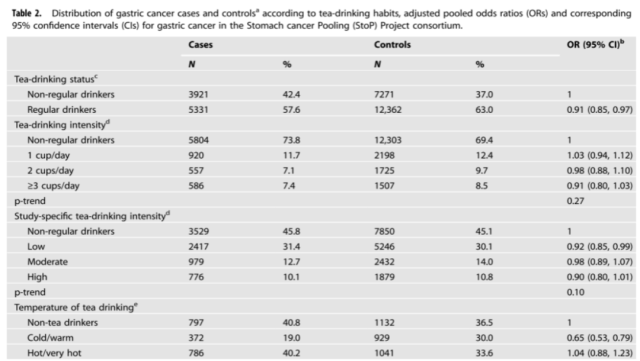
Analysis of the distribution of gastric cancer cases and control groups according to tea drinking habits
The researchers further conducted a stratified analysis of the tea drinker information, and the results showed that there were obvious heterogeneities in three variables, including geographic region (Q=11.5, p<0.001), Hp infection (Q=5.7, p=0.017), and control source (Q=8.5, p=0.003).
Among them, Asian studies showed that drinking tea was associated with a lower risk of gastric cancer (OR: 0.62, 95% CI: 0.48-0.81), while European and American studies had no association;
there was a significant negative association in H. pylori infection (OR: 0.68) , 95% CI: 0.58-0.80), while there was no association in the uninfected (OR: 0.96, 95% CI: 0.76-1.22);
furthermore, the risk reduction was limited to population-based controlled studies (OR: 0.86, 95 % CI: 0.80-0.92), while no association was found in hospital-based controlled studies (OR: 1.06, 95% CI: 0.94-1.19).
In addition, although there was no significant heterogeneity, tea consumption was associated with cardiac cancer (OR: 0.64, 95% CI: 0.49-0.84) and non-cardia cancer (OR: 0.77, 95% CI: 0.66), as well as intestinal histology Type (OR: 0.76, 95% CI: 0.63-0.92) also had some negative correlation.
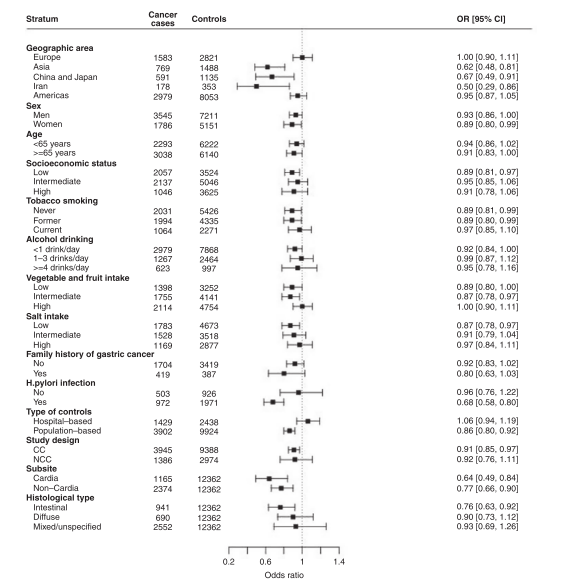
Stratified analysis of the relationship between variables and gastric cancer risk
Finally, the researchers fitted the dose-response relationship between tea drinking intensity and gastric cancer risk by natural cubic spline method, and the results showed that drinking three to ten cups of tea a day gradually reduced the risk.
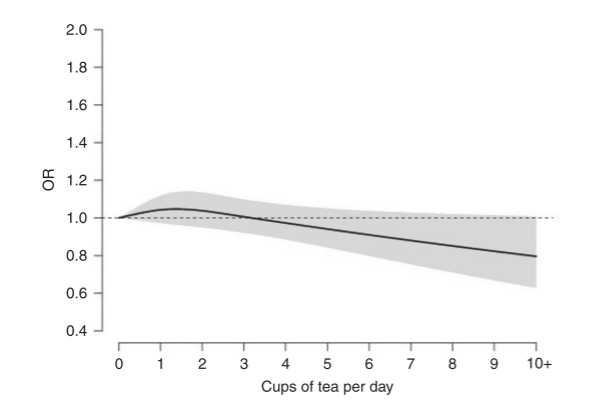
Association of tea drinking intensity (as a continuous variable) with gastric cancer risk
To sum up, this study is based on multiple research data of the global StoP project, indicating that there is a certain negative correlation between tea drinking and gastric cancer.
However, the habit of drinking tea, the type of tea, etc. have an impact on the correlation, so drinking tea to prevent stomach cancer must also drink the right tea, and know how to drink tea.
references:
[1] Statista. Volume of tea consumption worldwide from 2012 to 2025 (in million kilograms). 2021. https://www.statista.com/statistics/940102/global-tea-consumption/. Accessed 2 September 2021.
[2] Singh BN, Shankar S, Srivastava RK. Green tea catechin, epigallocatechin-3-gallate (EGCG): mechanisms, perspectives and clinical applications. Biochem Pharmacol. 2011;82(12):1807-1821. doi:10.1016/j.bcp.2011.07.093
[3] Deandrea S, Foschi R, Galeone C, La Vecchia C, Negri E, Hu J. Is temperature an effect modifier of the association between green tea intake and gastric cancer risk?. Eur J Cancer Prev. 2010;19(1):18-22. doi:10.1097/CEJ.0b013e328330eb1a
[4] Hoshiyama Y, Kawaguchi T, Miura Y, et al. A nested case-control study of stomach cancer in relation to green tea consumption in Japan. Br J Cancer. 2004;90(1):135-138. doi:10.1038/sj.bjc.6601512
[5] Khan MM, Goto R, Kobayashi K, et al. Dietary habits and cancer mortality among middle aged and older Japanese living in hokkaido, Japan by cancer site and sex. Asian Pac J Cancer Prev. 2004;5(1):58-65.
[6] Martimianaki G, Alicandro G, Pelucchi C, et al. Tea consumption and gastric cancer: a pooled analysis from the Stomach cancer Pooling (StoP) Project consortium [published online ahead of print, 2022 May 24]. Br J Cancer. 2022;10.1038/s41416-022-01856-w. doi:10.1038/s41416-022-01856-w
BJC: Drinking tea is related to a decrease in risks of gastric cancer
(source:internet, reference only)
Disclaimer of medicaltrend.org
Important Note: The information provided is for informational purposes only and should not be considered as medical advice.



